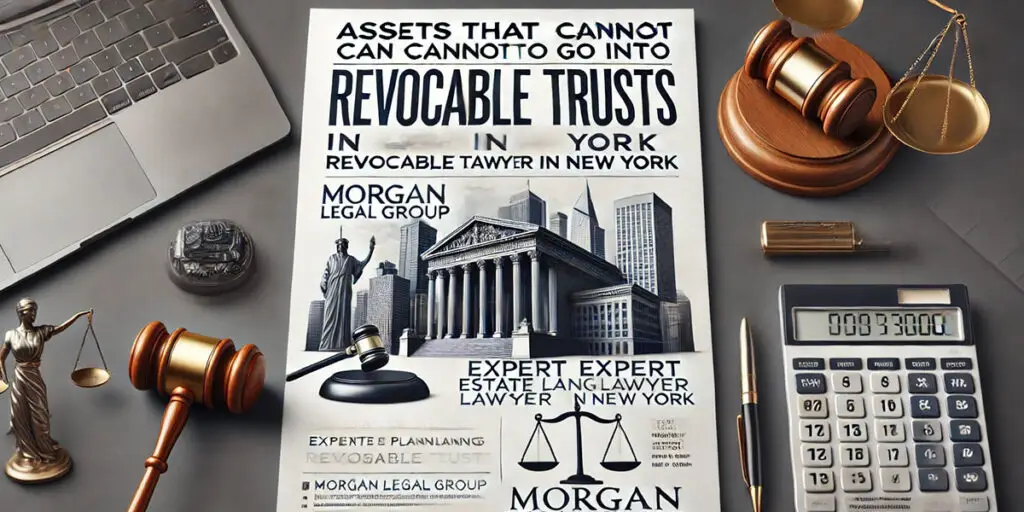Assets That Can and Cannot Go Into Revocable Trusts
Introduction to Revocable Trusts
Revocable trusts are a cornerstone of estate planning in New York, offering flexibility, privacy, and probate avoidance. However, knowing which assets to include and which to exclude is crucial to maximizing the benefits of a revocable trust. At Morgan Legal Group, we guide New Yorkers through the intricacies of trust planning to ensure their goals are met efficiently.
What Is a Revocable Trust?
A revocable trust, often called a living trust, is a legal entity created by a grantor to hold and manage assets during their lifetime and after death. Unlike an irrevocable trust, a revocable trust allows the grantor to maintain control, modify its terms, or revoke it entirely.
Benefits of a Revocable Trust
- Probate Avoidance: Assets in the trust bypass probate, enabling faster distribution to beneficiaries.
- Privacy: Unlike wills, trusts are not public records offering confidentiality for your estate.
- Control: The grantor retains control over trust assets during their lifetime.
- Flexibility: Changes to trustees, beneficiaries, and terms can be made as circumstances evolve.
Assets That Can Go Into a Revocable Trust
Determining the assets to place in a revocable trust requires careful planning. Below are the categories of assets commonly included:
1. Real Estate
Real property, including your primary residence, vacation homes, and investment properties, is often transferred into a revocable trust. Doing so avoids probate and ensures a seamless transfer to heirs.
Important Consideration: For properties with a mortgage, consult your lender before transferring the deed, as some lenders may invoke a “due-on-sale” clause.
2. Bank Accounts
Savings accounts, checking accounts, and certificates of deposit (CDs) can be titled in the trust’s name. This ensures liquidity for beneficiaries without going through probate.
Tip: Retain a separate account outside the trust for daily expenses and emergencies.
3. Investment Accounts
Brokerage accounts, stocks, bonds, and mutual funds are ideal candidates for trust funding. Transferring ownership to the trust ensures these assets are managed according to the trust’s terms.
4. Personal Property
Valuables such as jewelry, art collections, antiques, and vehicles can be included in the trust. For items without titles, a trust schedule listing these assets is often sufficient.
5. Life Insurance Policies
While life insurance is typically placed in an irrevocable trust for tax benefits, some individuals consider their revocable trust the beneficiary. This approach streamlines the distribution of policy proceeds.
6. Business Interests
Ownership interests in LLCs, corporations, or partnerships can be transferred to a revocable trust. This ensures management continuity and avoids disruption during the grantor’s incapacity or death.
Assets That Cannot or Should Not Go Into a Revocable Trust
While revocable trusts accommodate many asset types, certain categories are either unsuitable or legally restricted from inclusion.
1. Retirement Accounts
Individual retirement accounts (IRAs), 401(k)s, and similar accounts cannot be directly transferred into a trust without triggering taxable events. Instead, consider naming the trust as a beneficiary to maintain distribution control.
Example: Naming a revocable trust as the beneficiary allows you to specify terms for required minimum distributions (RMDs) to beneficiaries.
2. Health Savings Accounts (HSAs)
HSAs and medical savings accounts are tied to the individual account holder and cannot be owned by a trust. Naming a successor beneficiary is the best option.
3. Vehicles
While vehicles can be included in a trust, it is often impractical. Registration and insurance complications may arise, making it preferable to transfer vehicles through other estate planning tools.
4. Assets Subject to Liens
Properties or items encumbered by liens may complicate trust administration. It’s crucial to address outstanding debts before transferring such assets.
5. Assets in Joint Tenancy
Assets owned in joint tenancy with the right of survivorship do not need to be included in a trust, as they pass directly to the surviving owner outside of probate.
Steps to Fund a Revocable Trust
1. Draft a Trust Agreement
Begin by working with an experienced estate planning attorney to create a comprehensive trust document that outlines your wishes and terms.
2. Retitle Assets
Transfer ownership of assets into the trust by updating titles, deeds, and registrations to reflect the trust’s name.
3. Update Beneficiary Designations
For assets like life insurance and retirement accounts, designate the trust as the beneficiary if aligned with your estate goals.
4. Monitor and Maintain
Review your trust to ensure newly acquired assets are included, and the terms remain consistent with your intentions.
Common Misconceptions About Revocable Trusts
1. Trusts Are Only for the Wealthy
Trusts benefit individuals across all financial backgrounds by providing privacy, probate avoidance, and streamlined asset distribution.
2. All Assets Should Go Into a Trust
Not all assets are suitable for inclusion. Consulting with an attorney ensures you fund your trust strategically.
3. Trusts Eliminate All Taxes
Revocable trusts do not reduce income or estate taxes but offer other advantages such as probate avoidance and privacy.
Conclusion
Understanding the assets that can and cannot go into a revocable trust is fundamental to effective estate planning in New York. At Morgan Legal Group, we help clients navigate the complexities of trust planning to protect their legacies and streamline asset management. Contact us today to explore how a revocable trust can meet your needs.









